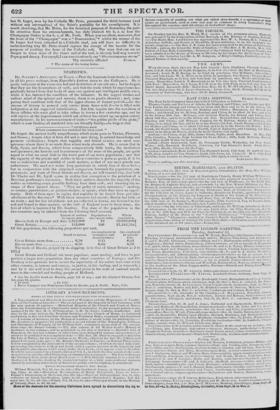STATISTICS.
Dn. SOUTIIKY'S ANTIPATHY TO THADE.—That the Laureate hates trade, is visible in all Iris prose writings, from Esprilla's Letters down to the Colloquies. He is justly indignant at the excessive toil and destitution of our artisans ; but he forgets that they are the descendants of serfs, and that the trade which he reprobates has gradually formed from that body of men our opulent and intelligent middle class, while it has bettered the condition of the labourer. In the ragged clothes and callous mind of the spinner and weaver, there is no poetic element ; and, com- paring their condition with that of the upper classes of former periods—for the stream of history in general only carries them down with it—he is tilled with indignation at the supposed deterioration. Let him inquire into the condition of those villeins who were glad to take refuge in towns a few centuries ago, and he will rejoice at the improvement which out of these has raised up our quiet orderly manufacturers. In his narrow estimate of trade—" the golden girdle of the globe," which is now binding all mankind into one friendly family—he forgets that
"art thrives most Where commerce has enriched the busy coast ."
He forgets the ancient lordly magnificence which trade gave to Venice, Florence, and Genoa ; forgets what it then did and is now doing, to extend knowledge and promote civilization ; forgets that cupidity and brutal avarice are more con- spicuous where there is no trade than where trade abounds. He is aware that in Italy, Spain, and Russia, which have comparatively little trade, the destitution and ignorance, the ferocity and licentiousness of the mass of the people, are quite equal to what we meet with in the worst part of our town population ; and that the rapacity of the priests and nobles in those countries is quite as great, if it be not so industrious and watchful of small matters, as that of our most greedy ma- nufacturers. We need not make long quotations to satisfy him of these facts ; but in conjunction with the subjoined comparison between the population, em- ployments, and trade of Great Britain and Russia, we will remind him, that both Dr. Clarke and Dr. Lyall agree in stating that corruption is the pabulum of a Rrossian gentleman's existence. Both these authors describe the majority of the nobles as extorting every possible farthing from their serfs, and dreading the re- venge of their injured slaves. "They are guilty of every meanness," stealing„ or turning pawnbrokers, or picture-dealers, or agents, when they have an oppor- tunity. Both of them agree in saying that cupidity in its basest form pervades all classes of tire Russians.* With these manners and morals. Russia has little or no trade ; and her few inhabitants not yet collected in towns, are fastened to the soil and bound to their masters, as the serfs of England were in those times, the loss of which is lamented by Dr. Southey. The state of the population io the two countries may be inferred from the following brief account.
Extent of surface Population to Whole in square miles. one square mile. oloopuoltitton it
Russia, both in Europe and Asia 5,912,000 10 Great Britain 118,000 180 21,193,5581. Of this population, the following proportions per cent.
Are employed in Are employed
Dwell in towns. commerce and in agricul- manufactures.
tore.
Great Britain more than 0,50 0,45 0,34 Russia more than 0,10 0,06 0,79 The trade of Russia, judged by its shipping, is to that of Great Britain as 3 to 129.§
Great Britain and Holland are more populous, more trading, and have in pro- portion a larger town population than any other countries of Europe ; and Dr. Southey is too patriotic not to assert the superiority of his native land over every other country, in honour and energy, in justice, in fair dealing, and in humanity ; and he is too well read to decry the second place in the scale of national excel- mice to the crowded and trading people of Holland.
* See Dr. Lyall's work on Russia, page 141 et seq.; and Dr. Clarke's Travels, Vol. 1st, page 94, quarto.
t ton 1S26. t In 1321.
§ Russo Compard aux Prineipaux Etats 'du Monde, par A. Balhi. Paris,1828.


















 Previous page
Previous page